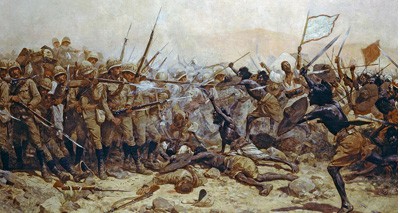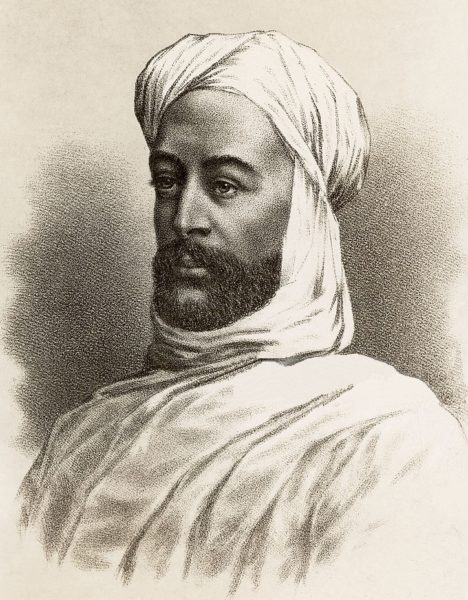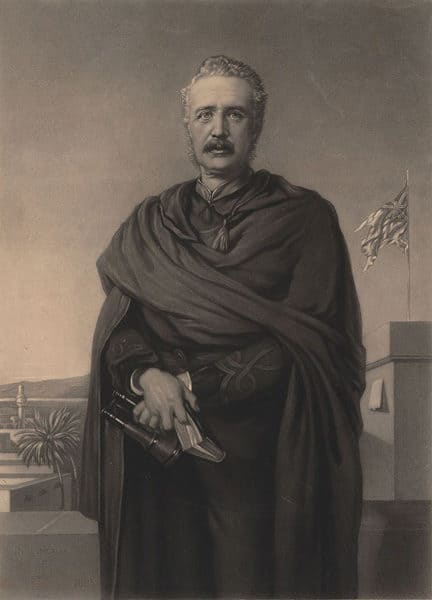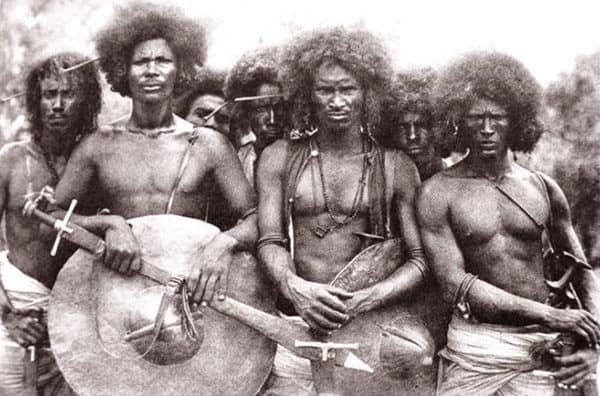The Islamic State in the Victorian Era
Sinclair Jenkins, American Renaissance, March 29, 2019

We’ve fought with many men acrost the seas,
An’ some of ’em was brave an’ some was not:
The Paythan an’ the Zulu an’ Burmese;
But the Fuzzy was the finest o’ the lot. . . .
So ‘ere’s ~to~ you, Fuzzy-Wuzzy, at your ‘ome in the Soudan;
You’re a pore benighted ‘eathen but a first-class fightin’ man;
— “Fuzzy-Wuzzy,” Rudyard Kipling (1892)
Rudyard Kipling, the bard of British imperialism, echoed the sentiment of many British soldiers in his poem “Fuzzy-Wuzzy.” But who was the Fuzzy-Wuzzy who, among the British army’s enemies, “was the finest o’ the lot”? They were the Beja tribesmen of Sudan. Renowned for their fierce independence and their elaborate, wild-looking hairstyles, the Beja and other Sudanese tribes battled the Anglo-Egyptian army between 1883 and 1899. During that protracted war, the fearless Beja often rode directly into the face of British rifles, armed only with spears and swords. The Beja scorned men who used firearms, and they fought under a pledge of loyalty to Muhammed Ahmed, the Mahdi of Islam.
The fanaticism and traditional Muslim practices of the Fuzzy-Wuzzies prefigured the Islamic State that arose more than 100 years later. The Muslim imperative to build a theocracy and impose harsh Muslim law on subject peoples continues to this day.
According to Michael Asher’s excellent book, Khartoum: The Ultimate Imperial Adventure, the Beja — specifically the Amarar who called themselves “ethnically pure” — claimed descent from Noah’s son Ham. There is no doubt that the Beja have a long tradition of rugged liberty.
In 1880 or 1881, the Beja and other Sudanese tribes rallied to a humble laborer with little religious teaching: Muhammad Ahmed, who had been proclaimed as the savior of Islam (Mahdi). He was appointed by a wandering holy man ‘Abdallahi wad Torshayn.[1] This drew thousands of Sudanese to Ahmed, and he and his inner circle began demanding the liberation of their lands and a return to the “pure” Islam of the 7th century.

Muhammad Ahmad
The first target of Mahdist rage was the Turco-Egyptian elite who ruled them. Venal and corrupt, these Ottoman officials had few friends among the Sudanese. In the eyes of the dervishes (the Western name for Mahdist soldiers), the Turco-Egyptian bureaucrats were apostates: Sunni Muslims who did not practice or appreciate the true faith. Even worse, many non-Muslims — including Jews as well as Greek, Assyrian, and Armenian Christians — worked for the Ottoman civil service.
The Khedive (ruler) of Egypt, Tewfik, could not let Sudan go. Tewfik’s ancestor, the great Muhammad Ali[2], had conquered much of the Sudan in 1822. Since then, it had been a colony of a colony (Egypt was nominally a province of the Ottoman Empire until the late 19th century), and although Sudan was not economically valuable or necessary for protecting Egypt’s southern border, Cairo wanted to maintain control. So, in 1883, Tewfik sent an expeditionary force into the Sudan to put down the Mahdist insurgency.
The force included 8,300 infantrymen and 2,000 cavalry, armed with 16 Krupp mountain-guns field pieces, and many Nordenfeldt machine guns.[3] This modern army was led by European officers, headed by William Hicks, aka Hicks Pasha. A veteran of the British East India Company’s Bombay Army, Hicks had distinguished himself during the Sepoy Mutiny of 1857. In 1867 and 1868, he had been a general in the epic Abyssinian Expedition, which punished Emperor Tewodros II of Ethiopia for imprisoning European missionaries and British emissaries. Hicks was one of many European soldiers lured to Egypt with promises of wealth and status.
Despite good equipment and capable officers, the expeditionary of 1883 was a paper tiger. Most of the men in Hicks’s army were Egyptian peasants (fellahin), who were known to mutilate themselves rather than serve in the Sudan. Gustav Klootz, a German socialist, deserted and betrayed the expeditionary force. When Ahmed’s 40,000 dervishes ambushed Hicks’ men at El Obeid, thousands of Egyptian soldiers dropped their weapons and fled. Others begged for their lives in the hope that their Muslim faith would save them. Many were stripped naked and sold as slaves in Mahdist markets.
Hicks and the Europeans went down fighting. A dervish veteran of the battle said that Hicks “was full of courage like an elephant.”[4] He reportedly emptied and reloaded his revolver three times, then, out of ammunition, charged into a dervish column with his sword. The Beja warriors were impressed by the bravery of Hicks and the other Europeans, but still mutilated the corpses.
The news of the slaughter caused panic among the British military and civilian leaders, who had administered Egypt since 1882. Some thought Sudan should be abandoned. Lieutenant General Lord Garnet Wolseley, the man who had taken Egypt from the Ottomans in the first place, echoed this sentiment for a time.
Some British Army officers and politicians, especially those in the Conservative Party, blamed the collapse of Anglo-Egyptian power in the Sudan on the weak rule of Liberal Prime Minister William Gladstone. Under pressure from the public and from Queen Victoria herself, in 1884, Gladstone’s government decided to send a military envoy to the Sudan to report on the situation. The man they chose became one of the Victorian era’s great martyrs.
Major General Charles “Chinese” Gordon was an intellectual, a devout Christian, a mystic, and a talented field commander. Gordon had earned the nickname “Chinese” in the 1860s when he had served as one of the European commanders of Qing China’s “Ever Victorious Army.” Financed by European and American merchants in Shanghai, Hong Kong, and other port cities, and officered by a colorful cast of mercenaries and military veterans, the Ever Victorious Army helped end the bloody Taiping Rebellion. Gordon later said that the average Chinese soldier “fought for loot only” and ran away most of the time.[5] He had served as the governor-general of the Sudan, and held a similarly dismal view of the average Sudanese.

General Charles “Chinese” Gordon
Gordon marched down the Nile and established himself as the new British viceroy in Khartoum, but his garrison was besieged by a dervish force of over 50,000. Gordon had only 7,000 Egyptian and Sudanese troops, and sent reports to Cairo and London about this desperate situation. Many reports were ignored, and most were received many weeks after they had been sent. Gordon and his starving garrison had to wait for months until a relief expedition was even discussed, let alone assembled.
General Wolseley, an ardent supporter of Gordon, assembled the Gordon Relief Expedition in late 1884. Rather than make the same mistake as Hicks, Wolseley went south with a mostly British force. Wolseley also created one of the first modern special-forces units, the Desert Column, made up of the best British cavalry, mounted on Arab camels. Like the Victorian army generally, the vast majority of soldiers who fought in what became known as the Nile Campaign were Englishmen.[6]
Between 1884 and 1885, these men fought several gory and unequal battles with the Fuzzy-Wuzzies. At the Battle of et-Teb, the British suffered 35 casualties, while their dervish opponents lost over 2,000 men.[7] When dervishes attacked the Royal Navy’s Hecla, Captain Arthur Wilson decapitated and otherwise killed several enemies despite a stab wound in the abdomen. When his sword broke, Wilson fought with his fists.
At the later Battle of Tamaai, the legendary Black Watch mounted an impromptu bayonet charge when their fighting square was breached. The average British soldier proved he was better than the Fuzzy-Wuzzies at their own game of frontal assault, armed only with steel.
The Nile Expedition failed to rescue Gordon. On January 26, 1885, thousands of Mahdist troops stormed into Khartoum. Gordon, like Hicks, fought to the death. According to his aide-de-camp, Gordon retreated to his palace armed with a revolver and a sword. He fired and reloaded his revolver, while also hacking and slashing dervish spearmen. Gordon killed and wounded an unknown number of Sudanese before he was killed with repeated stab wounds and at least one revolver bullet. Like Hicks, his body was defiled and decapitated. For the rest of her life, Queen Victoria blamed the slow-moving Gladstone for Gordon’s death.[8]

“Fuzzie-Wuzzies”
Gordon’s martyrdom became famous; few learned what happened to Khartoum’s small European community. Dervishes cut off the hands of Nikolaos Leontides, the Greek consul, before they beheaded him. They shot one Greek father in the head, brained his son with an ax, and took his pregnant wife as a concubine. Martin Hansall, the Austro-Hungarian consul, had his head lopped off when a former servant betrayed him. Franz Klein, a tailor, had his throat slit. His Italian wife and their five children were forced to watch, and the killers then raped one of the daughters. The city’s Catholic Mission was raided and drenched in blood.[9]
The people of Britain had to wait three years for revenge. In the meantime, the Sudan became a theocratic state, an early Islamic State. It encouraged conquest, slave-taking, rape, and the extermination of tribes suspected of any loyalty to the Anglo-Egyptian government.
The Mahdist regime ended in 1898 at the Battle of Omudrman. Here, a British, Egyptian, and Sudanese army of over 25,000 men destroyed a dervish force of 52,000. The British, who used Maxim machine guns and the latest artillery and rifles against spears and swords, suffered fewer than 50 dead. The Mahdists lost about 12,000. A year later, the Sudan was pacified.
The British left the Sudan in 1955. As for the dervish fighters, their bravery was legendary, but so was their cruelty, and echoes of dervish theocracy linger on in Sudan and South Sudan, which are plagued by wandering gunmen who rape, rob, and beat the women of opposing tribes. Sudan’s old problems are our new problems. British, Ottoman, and Egyptian officials learned how to deal with primitive Islam. We have to learn all over again.
[1] Asher, Khartoum, 51.
[2] Muhammad Ali, the founder of modern Egypt, was an ethnic Albanian born in Ottoman Macedonia.
[3] Asher, Khartoum, xxiii.
[4] Asher, Khartoum, xxii.
[5] Asher, Khartoum, 72.
[6] Asher, Khartoum, 111.
[7] Raugh, Harold E. The Victorians At War, 1815-1914: An Encyclopedia of British Military History (Santa Barbara: ABC-CLIO, 2004): 132.
[8] Asher, Khartoum, 280.
[9] Asher, Khartoum, 261-262.















